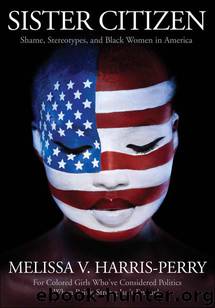Sister Citizen: Shame, Stereotypes, and Black Women in America by Melissa V. Harris-Perry

Author:Melissa V. Harris-Perry [Harris-Perry, Melissa V.]
Language: eng
Format: epub, mobi
Publisher: Yale University Press
Published: 2011-09-20T08:00:00+00:00
The Consequences of Self-Reliance
Although the strong black woman is a pervasive symbol among African Americans, it has been subject to severe criticism for several decades. At the Expo for Today’s Black Woman, where attendees were so willing to characterize black women as strong, one of the best-attended sessions was “Escape the Cape: The Superwoman Complex.” As African American women have increasingly organized on their own behalf in the past half-century, they have also interrogated the limiting effects of the myth of strength.26 Yet there is little empirical evidence on how self-reliance influences black women’s overall quality of life. To address this concern empirically, I turn to the 1995 Detroit Area Study, a detailed survey of several hundred men and women, both black and white, that examined the social influences affecting physical and mental health. Admittedly, this survey is dated and limited in regional scope, but it contains questions that are rarely asked of a large and diverse sample of Americans and therefore is still useful for illuminating the concepts I am interested in here.27
The first important finding from the Detroit survey is that black women differ from other groups on a number of social and emotional factors. They lag behind black men and whites in both emotional and physical well-being. More than 50 percent of white men, white women, and black men reported that their physical health was very good or excellent. Among black women, only 41 percent ranked their health in these categories, and more than a quarter rated their health as fair or poor. The same was true of general life satisfaction. In every other race and gender category, at least 50 percent of respondents were completely or very satisfied with their lives, but only 42 percent of black women responded this way. African American women were neither significantly less nor more sad, but they were less satisfied with their lives and physical health. (For survey data, see Appendix, table 4.)
The Detroit study also suggests that black women experience their intimate relationships with friends and family differently from other individuals. While black women reported feeling loved by their friends and families as much as other groups, they also experienced families as a site of demands and burdens and sensed that their families demand too much of them. Black women reported lower quality of health, less satisfaction with their lives, and a greater sense of being burdened. No other group shares this unique constellation of concerns. Despite this, black women felt that they must be strong, independent, and self-reliant. They overwhelmingly believed that they could do anything they set their mind to, that their future depended on themselves alone, that having things done right required doing them yourself, and that signs of defeat were just signals to work harder. Together, these results speak to the particular legacy of the strong black woman as a cultural ideal. Black women feel less well, less satisfied, and more burdened than everyone else and yet they believe it is their responsibility to overcome life obstacles alone and to achieve despite having fewer physical, emotional, and social resources.
Download
Sister Citizen: Shame, Stereotypes, and Black Women in America by Melissa V. Harris-Perry.mobi
This site does not store any files on its server. We only index and link to content provided by other sites. Please contact the content providers to delete copyright contents if any and email us, we'll remove relevant links or contents immediately.
| Anthropology | Archaeology |
| Philosophy | Politics & Government |
| Social Sciences | Sociology |
| Women's Studies |
The Secret History by Donna Tartt(19085)
The Social Justice Warrior Handbook by Lisa De Pasquale(12190)
Thirteen Reasons Why by Jay Asher(8909)
This Is How You Lose Her by Junot Diaz(6885)
Weapons of Math Destruction by Cathy O'Neil(6279)
Zero to One by Peter Thiel(5801)
Beartown by Fredrik Backman(5751)
The Myth of the Strong Leader by Archie Brown(5507)
The Fire Next Time by James Baldwin(5442)
How Democracies Die by Steven Levitsky & Daniel Ziblatt(5218)
Promise Me, Dad by Joe Biden(5153)
Stone's Rules by Roger Stone(5087)
A Higher Loyalty: Truth, Lies, and Leadership by James Comey(4960)
100 Deadly Skills by Clint Emerson(4924)
Rise and Kill First by Ronen Bergman(4788)
Secrecy World by Jake Bernstein(4752)
The David Icke Guide to the Global Conspiracy (and how to end it) by David Icke(4717)
The Farm by Tom Rob Smith(4507)
The Doomsday Machine by Daniel Ellsberg(4490)
